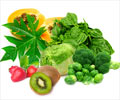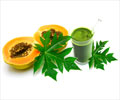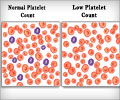Medindia » Multimedia » Slideshows » Top 10 Foods to Increase your Blood Platelets Count Naturally

One tends to associate low and deficient platelet counts or thrombocytopenia with viral infections like dengue, HIV, chickenpox. However, deficiencies of folate and vitamin B12, alcohol consumption, leukemia, chemotherapy, medication side-effects, autoimmune conditions, bypass surgery, idiopathic thrombocytopenic purpura (bleeding disorder) and host of other reasons can lead to breakdown of platelets in liver, spleen, and blood; insufficient platelet production in the bone marrow; or low platelet count in the blood owing to platelets sequestration in the spleen. Platelets are responsible for blood clotting. However, folic acid or vitamin B9; vitamin B12; vitamin C and omega-3 fatty acids provide support for the healthy functioning of platelets. Our general food habits can combat the fall or destruction of platelets. Severe cases, though, will need medical attention.

Papaya leaf juice can arrest the diving platelet counts and increase platelets by at least 1 lakh/μL in over 7 to 8 days. Carica papaya leaves contain various phytoconstituents like tannins, cardiac glycosides saponins, and alkaloids. It creates a protective effect on the bone marrow. Studies have proven that Carica papaya leaves promote hemopoiesis (blood cell formation)
Method Papaya leaf extract can be consumed in juice form or as a capsule supplement. The washed papaya leaves are ground in a processor or in a mortar with a little water. When the thick paste is ready, the pure juice is squeezed into a bowl. Drink 25 ml of the juice twice a day for 5-7 days.
The therapeutic role of Triticum aestivum (wheat) grass in drug induced thrombocytopenia was studied. Wheat grass significantly increased platelet count and reduced bleeding time in thrombocytopenic rats. Wheat grass juice is rich in chlorophyll, calcium, phosphorus, magnesium, sodium and potassium, vitamins, minerals, amino acids. Studies have proved that wheat grass increases the levels of hemoglobin (Hb) , red blood corpuscles (RBC), total white blood corpuscles (WBC) and differential WBC counts. It detoxifies the liver and blood. Chlorophyll is a phytonutrient which is also called the life force.
Method Grind the wheat grass in the mortar, with some water. When the thick paste is ready, put it in the muslin cloth, and squeeze it, to extract the juice. Drink 30 ml of the juice at least once a day.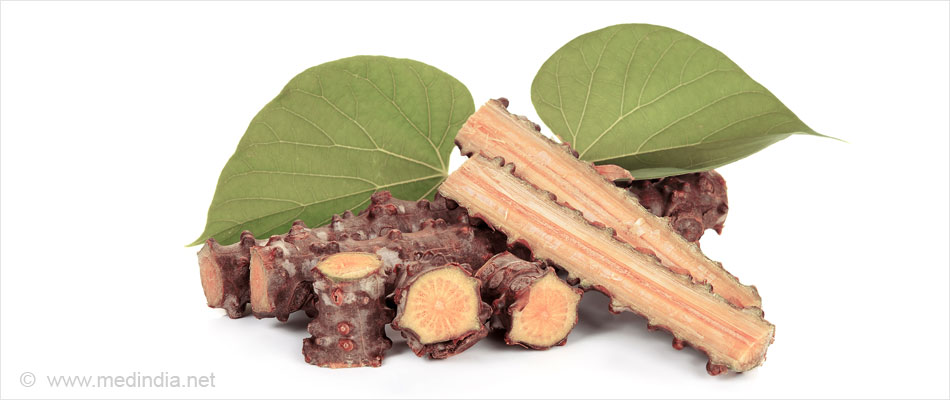
Guduchi (Tinospora cordifolia) is also known as giloy. An experimental study showed that guduchi increased the platelet count. Guduchi Taila was found to have immunostimulating activity. It has alkaloids, steroids, diterpenoid lactones, aliphatics, and glycosides. It has anti-diabetic, anti-spasmodic, anti-arthritic, anti-inflammatory, anti-malarial, antioxidant, anti-allergic, anti-leprotic, and hepatoprotective properties.
Method Soak 4-5 cm long giloy stems in 2 glasses of water overnight. In the morning the whole concoction is boiled till the water is reduced to half or one fourth. It can be taken twice or thrice a day.
A clinical study showed that aloe vera extract increased platelet count significantly. Aloe vera has anti-viral properties and is used to lower blood glucose and blood lipids.
Method Gel of half a aloe vera leaf can be consumed after mixing it with water or any other juice.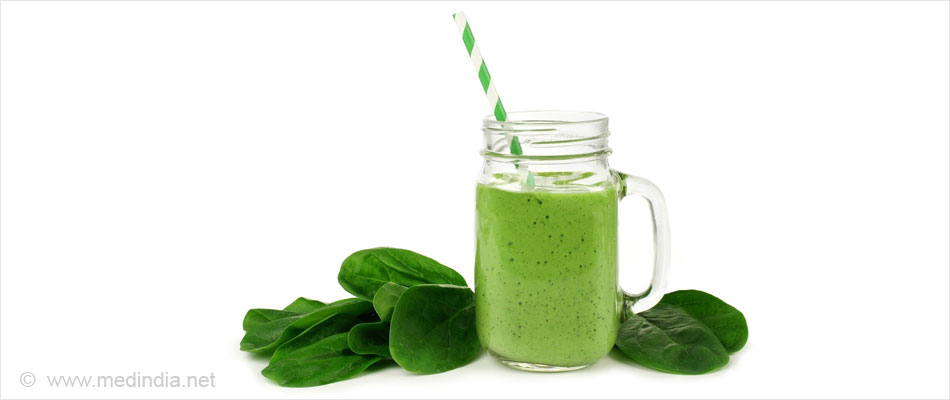
Deficiency of folate in the body can lead to reduction in production of blood platelets. Folic acid or Vitamin B9 helps in healthy cell division. Platelets die every 10 days. Boiled spinach is rich in folic acid. Whole wheat, asparagus, orange juice, green leafy vegetables, can be consumed on daily basis. Half your cereals should be whole wheat. Half bowl of boiled spinach or glass of spinach juice can be consumed daily.

Vitamin C works as an antioxidant and boosts immunity. Studies have shown modest beneficial effects of iron and vitamin C on platelet function.
Moringa oleifera (Drumstick) Drumstick tree believed to cure over 300 diseases. It has vitamin C, 7 times more than its equivalent in oranges. It is considered as herbal storehouse of vitamins, minerals, iron and calcium. It is not only an antioxidant but also has anti-tumor, anti-inflammatory, anti-ulcer, hepatoprotective, anti-diabetic, antibacterial properties. Moringa leaves can be consumed dried, cooked or fresh. Oranges One small orange has around 51mg Vitamin C. Thus daily consumption of a glass of orange juice is beneficial to maintain normal blood count. Kiwi One fruit has around 64 mg of Vitamin C. Moringa, spinach and dates are rich in iron. Multi-colored fruits and vegetables like carrots, tomatoes, broccoli, and strawberries provide various nutrients and alleviates deficiencies of vitamins and minerals. Most of them increase the hemoglobin and RBC.
A clinical study showed that there was a significant increase in plasma HDL (good cholesterol) concentrations and platelet phospholipid eicosapentaenoic acid (EPA) and docosahexaenoic acid (DHA) levels after fish-oil supplementation. However, some studies indicate that it can delay blood clotting. Thus daily requirement of omega-3 fatty acids can be met by including cod liver oil, walnuts or fish with low mercury levels like salmon in the diet in moderation.

Berries such as strawberries, blueberries, raspberries, goji berries and blackberries are rich in antioxidants. Antioxidants tend to neutralize the free radicals and thus help cope with the decrease in platelet count. Including berries in the diet may help in increasing platelet count. A bowl of fresh or frozen berries can be consumed as a salad or added to Greek yogurt.
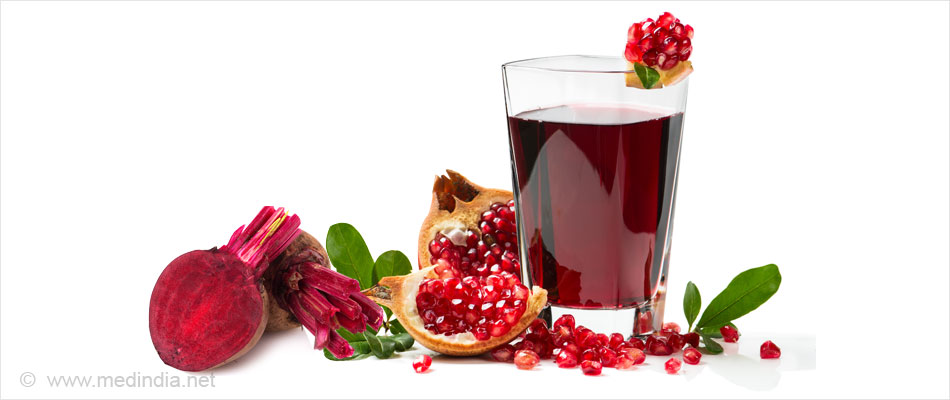
Pomegranate
Pomegranate is a good source of iron and other essential nutrients thus assists to increase blood platelet count. About 100 grams of pomegranate provides around 17% of Vitamin C daily requirement. In the juice form the concentration of Vitamin C increases. Regular intake of pomegranate can help combat platelet reduction. Beet Root Beetroot is a good source of iron, folate, nitrates, potassium and other antioxidants. Beetroot is often suggested for anemic patients. Including beetroot in the diet at least twice a week can help increase the blood platelet count. Beetroots can be relished in the form of salad, juice or soup. It can be consumed raw or cooked.
A report in the Journal of Environmental and Public Health showed that idiopathic thrombocytopenic purpura or ITP can be treated with the dosage of 4,000 IU of vitamin D/day. The researchers reported in Journal of Medical Case Reports, that the prescribed dosage of Plaquenil, prednisone and vitamin D, stabilized the platelet count. Whereas when the high dosage of vitamin D was discontinued, the platelet count decreased. Continuous intake of Vitamin D arrests the fall of platelets counts and increases the platelet counts.
Fortified cereals, mushroom, egg yolk, dairy products, and oily fishes are some of the good sources of vitamin D. Vitamin D is consumed in the form of vitamin D3 or cholecalciferol. One capsule of 60,000 IU of Vitamin D is recommended once a month. For medication purposes the dosage has to be prescribed by the doctor. MEDINDIA
MEDINDIA
